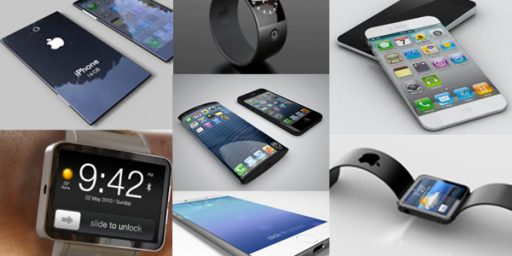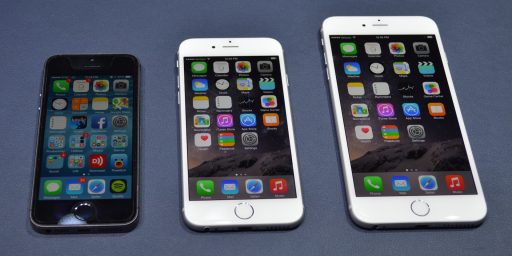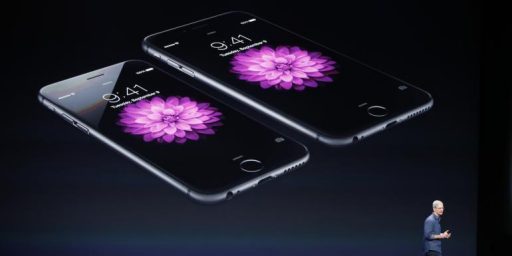Law Enforcement Claims New Apple And Google Encryption Policies Will Hurt Investigations
The FBI and other law enforcement agencies are pushing back against Apple and Google's efforts to provide greater privacy to users.. They're wrong.
In the wake of the announcement that Apple would be making changes to iOS that would make it impossible for the company to unlock user’s iPhones and iPads even if law enforcement presented them with a search warrant, Google announced that they would be making similar changes to its Android operating system. Not surprisingly, these announcement by the two predominant smartphone OS’s on the market are causing some consternation among members of law enforcement, who are claiming that the moves will make it harder for them to do their jobs:
FBI Director James B. Comey sharply criticized Apple and Google on Thursday for developing forms of smartphone encryption so secure that law enforcement officials cannot easily gain access to information stored on the devices — even when they have valid search warrants.
His comments were the most forceful yet from a top government official but echo a chorus of denunciation from law enforcement officials nationwide. Police have said that the ability to search photos, messages and Web histories on smartphones is essential to solving a range of serious crimes, including murder, child pornography and attempted terrorist attacks.
“There will come a day when it will matter a great deal to the lives of people . . . that we will be able to gain access” to such devices, Comey told reporters in a briefing. “I want to have that conversation [with companies responsible] before that day comes.”
Comey added that FBI officials already have made initial contact with the two companies, which announced their new smartphone encryption initiatives last week. He said he could not understand why companies would “market something expressly to allow people to place themselves beyond the law.”
(…)
For detectives working a tough case, few types of evidence are more revealing than a smartphone. Call logs, instant messages and location records can link a suspect to a crime precisely when and where it occurred. And a surprising number of criminals, police say, like to take selfies posing with accomplices — and often the loot they stole together.
But the era of easy law enforcement access to smartphones may be drawing to a close as courts and tech companies erect new barriers to police searches of popular electronic devices. The result, say law enforcement officials, legal experts and forensic analysts, is that more and more seized smartphones will end up as little more than shiny paperweights, with potentially incriminating secrets locked inside forever.
The irony, some say, is that while the legal and technical changes are fueled by anger over reports of mass surveillance by the National Security Agency, the consequences are being felt most heavily by police detectives, often armed with warrants certifying that a judge has found probable cause that a search of a smartphone will reveal evidence of a crime.
“The outrage is directed at warrantless mass surveillance, and this is a very different context. It’s searching a device with a warrant,” said Orin Kerr, a former Justice Department computer crimes lawyer who is now a professor at George Washington University.
Yet the devices themselves are gradually moving beyond the reach of police in a range of circumstances, prompting ire from investigators. Frustration is running particularly high at Apple, which made the first announcement about new encryption and is moving much more swiftly than Google to get it into the hands of consumers.
“Apple will become the phone of choice for the pedophile,” said John J. Escalante, chief of detectives for Chicago’s police department. “The average pedophile at this point is probably thinking, I’ve got to get an Apple phone.”
Manhattan District Attorney Cyrus Vance Jr. made similar comments in an Op-Ed in The Washington Post:
Apple and Google have brought their products to a new level of privacy, and of course privacy is critically important to our society. But the protection of privacy is found in the Constitution, which requires warrants issued by neutral, detached judges and supported by probable cause before law enforcement can obtain information from a mobile device. Absent certain narrow exceptions, my office cannot search a mobile device without a warrant. Neither can the other thousands of state and local prosecutors offices throughout the country. The warrant requirement assures that peoples’ possessions and privacy remain secure in all but exceptional circumstances.
Apple’s and Google’s software updates, however, push mobile devices beyond the reach of warrants and thus beyond the reach of government law enforcement. This would make mobile devices different from everything else. Even bank security boxes — the “gold standard” of the pre-digital age — have always been searchable pursuant to a judicial warrant. That’s because banks keep a key to them.
I am aware of no plausible reason why these companies cannot reverse these dangerous maneuvers in their next scheduled updates to iOS 8 and Android “L.” Apple’s and Google’s software should not provide aid and comfort to those who commit crimes. This is not a matter of good or bad corporate citizenship. It is a matter of national public safety.
There are clearly some legitimate issues raised by the decision that Apple, and now Google, has made here. The contents of a suspects smartphone or tablet is likely to contain information that could be crucial to a criminal investigation including photos, email and text messages, contacts lists, electronic documents, and social media activity. Prior to these changes, law enforcement officers wishing to gain access to the contents of a locked phone or tablet would be able to obtain a warrant and then serve it on the appropriate third party which would then be obligated to unlock the phone. Now, however, that will not be possible because Apple and Google will be able to respond to these requests by saying that unlocking the phone is impossible for them. At the very least, this means that a very convenient avenue for the police in these types of situations has been shut off to them and they will need to find other means to conduct their investigation. The fact that law enforcement might have to do more legwork, for example, is not justification for the kind of attack on Google and Apple that we’re seeing here.
Quite obviously, making these electronic devices more private is something that both companies have decided to do in the wake of the revelations about the National Security Agency’s surveillance programs and the widespread concerns about privacy that those revelations prompted. Undoubtedly, the fact that phones and tablets will now be more secure from monitoring and tampering is something that consumers will react to positively and, in the end, that is exactly what Apple and Google ought to be doing, responding to their customers. Arguing that the companies should be dissuaded from making these changes because things might be a little more difficult for law enforcement quite simply doesn’t hold water in this context, especially since there remain ways for investigators to gain access to a device that they are interested in. They could, for example, simply try to guess the password, a strategy that might be more successful than it sounds simply because most Americans aren’t very good about creating passcodes are difficult to crack. They could also try to utilize a so-called “brute force” attack that throws passcodes at the operating system until it finds the correct one. That strategy, admittedly, is not one that smaller law enforcement agencies may be capable of undertaking and the cost and time involved may not be justifiable in all cases, however it is available and it does put the lie to the assertion that what Apple and Google are doing is going to unreasonably hobble law enforcement.
Finally, as I noted in my original post on this issue, police confronted with a locked electronic device could seek a search warrant compelling the suspect or target of the investigation to provide them with the unlock code, While the Supreme Court has yet to rule on the issue, the law on the issue of whether or not a party can be compelled to reveal an electronic passcode to police has mostly fallen on the side of law enforcement. Given all all of this, the arguments from the FBI and District Attorney Vance seem to me to be quite overblown. There are more than enough resources at law enforcement’s disposal to deal with this issue, the fact that Apple and Google are moving to provide an additional level of security to their customers is not going to hobble them significantly. In the end, the benefit to the public in these changes outweighs the minor inconveniences that law enforcement will suffer in their investigation, and hopefully neither company will now to government pressure on this.







Oh give me a break. That is laughable. It has been proven time and time again, that getting a warrant is no barrier at all, and judges are perfectly willing to let police search anything, anytime, anywhere, based on absolutely no evidence whatsoever. Ask this guy
Anyone who still states that judges are “neutral and detached” when it comes to cops v. suspects, are either willfully blind or lying. In fact a federal judge has already come right out and admitted that he ISN’T neutral. He just always believes cops.
Resistance is Futile. They’re going to find out whatever they want whenever they want. These same people who want Google & Apple to protect them will casually use public WIFI at Starbucks or on the Acela, the worst places to protect your privacy.
People who also use anonymous software like TOR are now being flagged. If anyone is truly concerned with privacy, get rid of your cell phone, computer, & credit cards. You have to live off the grid like Jack Reacher if you want true privacy. I used to have a security good set up, but finally waved the white flag or I’d be flagged.
The recodds of who you have called and messaged exist on third party servers already, So the police can just issue a warrant to the phone company. So, no issue there other than convenience.
And, the worst case scenarios immediately presented — child pornography rings and terrorist cells — communicate with each other, so they are still vulnerable.
The other scenarios, idiots taking selfies with their stolen goods and accomplices, is just not that interesting or compelling to undermine privacy rights for. Besides, they probably have auto-backup turned on and a password of 1234.
Android has had the ability for serious encryption for some time. There’s almost nothing new about it….Other then people just now caring about it.
Government pays the price of overreach. It will only get worse as the ISP model is eroded by mesh nets, coupled with strong end-to-end encryption, the demand for which would be negligible absent the Snowden revelations.
Wasn’t the Fourth Amendment supposed to make investigations harder?
“Apple will be the choice for pedophiles…” by this logic, we should ban cameras so no one can take a picture of naked kids….there pedophilia problem solved!
Serious question here: the police get a search warrant for your home, and in that home they find a locked safe. They do not find a key or combination or whatever it takes to open the safe.
What rights do they have at that point? Can they drill the safe? Break open your piggy bank? Rip up the floors, just in case you’ve hidden something under the hardwood?
@DrDaveT: My understanding (not a lawyer, though) is that with a search warrant they can turn your house upside-down. Drill safes, take your computers to analyze, etc.
@James in Silverdale, WA:
Exactly. Perhaps they should’ve thought of this potential result before snooping on innocent Americans.
I was wondering if you ever thought of changing the page layout of your site?
Its very well written; I love what youve got to say.
But maybe you could a little more in the way of content so people could connect with it better.
Youve got an awful lot of text for only having one or two pictures.
Maybe you could space it out better?
Do you mind if I quote a few of your posts as long as I provide credit and sources back to
your blog? My blog site is in the very same area
of interest as yours and my users would really benefit from
some of the information you present here. Please let me know if this ok with you.
Regards!
@DrDaveT:
It depends on the scope of the warrant.
If, for example, a judge issued a warrant to search your home for a stolen 50″ flat screen TV and nothing else, then opening a container that would obviously not be big enough to hide that TV would subject any evidence found within to be excluded.
The trick prosecutors play in that scenario, is to ask the judge for a warrant to search for the TV and the remote control. That way, the cops can search anywhere they want–basically a fishing expedition.
OTOH, if a warrant is issued to search for child pornography, then they can turn your house upside down.
@PogueMahone:
The holy grail is a document warrant since documents can be hidden anywhere. They can then tear out the walls, drill the safe and look in you underwear drawer.
Apparently the main privacy problem in the future is going to be securing blogs against spam by private marketers ;-).
The nightmare scenario for law enforcement is the terrorist who uses a 30 digit password to protect his phone and who doesn’t care about being held in contempt because he is ready to die for his cause (Hey, throw in a ticking bomb).
In reality that is pretty unlikely. But it makes for a pretty good Hollywood script.
All above said, I think Doug does seem to underestimate how difficult it would be to break into a mobile device protected by a strong password. It would be like an invulnerable safe, even to a police investigator with a properly obtained warrant that meets all Fourth Amendment requirements. I doubt a contempt citation is going to scare a hardened criminal facing a long prison sentence if convicted, so that’s not going to help law enforcement.
I understand why commenters above aren’t sympathetic to law enforcement but local law enforcement had nothing to do with NSA actions, so their contempt is misplaced.
What Apple and Google have done is to take themselves out of the law enforcement process, which protects them from customer ire. But I’m not sure it solves the problem.
It’s almost comical in it’s predictability;
The usual crowd screaming for more government and then screaming when they get it.
It amazes me that there is anyone at all, left, who doesn’t understand that the natural state of government, as with anything else, is growth. Government will invariably grow beyond it;s original (Need I say, legal/constitutional?) boundaries.
Ive watched for decades as the usual crowd bellyaches for more government, giving government ever increasing power… healthcare, gun control, the welfare state, etc etc…. and then screaming bloody murder when they see government doing what it has historically always done…. grow beyond the levels they’re comfortable with, as government uses that newfound power.
@Eric Florack:
Interestingly enough there’s a real anti-symmetry here. The people usually calling for smaller government want a large one in this case (ie want the gov’t to be able to access the iPhones), whereas the ones usually asking for a larger government want it to be smaller in this case.
The truth of the matter is though, that both Democrats and Republicans want a bigger government. They just want it in different areas. And I’d argue that in this case, at least the Democrats are honest about wanting a large gov’t – the Republicans are dishonest (want small gov’t but big military – presumably not a privatized military though, big police – again not privatized, and security measures like this one and the Patriot Act).
Given the two, I’d go for the one that is honest. The ones who claim to want a small gov’t and then constantly ask for a large one (long list, the above and things like the War on Drugs) can’t be trusted; they’re openly lying.
There’s a major difference between national security in wartime, for example, and having full access to my health recrods, with no seciurity issues involved, wouldn’t you say.george?
Also please consider the idea that the military is in the constitution, and healthcare, for example, is not.
@ Florack
Modern health care was not even a concept at the time the Constitution was drafted. Does this mean that we should ignore the health care needs that exist here in the 21st century? Aviation is not in the Constitution either. Does this mean we should abolish air traffic controllers?
@Eric Florack:
I think Franklin’s quote, “Those who would give up essential Liberty, to purchase a little temporary Safety, deserve neither Liberty nor Safety.” works equally well in both situations, actually. Trustworthy or untrustworthy, the nature of the gov’t and the individuals in it doesn’t magically change during war.
And whether the military is in the constitution or not is irrelevant to the size of the gov’t – big is big (and measured in either number of gov’t employees or tax dollars spent the military is big gov’t). Of course, I think spending money on defense is a good investment (spending on foreign adventures not so much – neither did the Founders btw), but I’m not pretending that the smaller the gov’t the better.
Moreover, the other main federal spending items don’t seem to be unconstitutional (at least I don’t seem to recall any SC decision to the effect that social security and medicare are unconstitutional), so I’m not sure how their constitutional legality is any different than the military’s.
@ Florack
You must mean Republicans. They are the ones what were cheering at the top of their lungs while the surveillancestate was being set up and Bush was making vast increases in the size, scope, power, and cost of government.
Those of us who have been around OTB for a while remember your “Oh God, oh please I don’t care how you do it just save me from Bin Landen” phase…
@DrDaveT: UNITED STATES v. HUBBELL
“It was unquestionably necessary for respondent to make extensive use of “the contents of his own mind” in identifying the hundreds of documents responsive to the requests in the subpoena. … The assembly of those documents was like telling an inquisitor the combination to a wall safe, not like being forced to surrender the key to a strongbox.“.
It seems clear that they cannot force you to give up the combination but can force you to give up a physical key, but that won’t keep them from opening the safe.
@Eric Florack: Great so now we’re in a war that has absolutely no possible end… How convenient…
@Stonetools:
And yet, local law enforcement are using STINGRAY devices.
Stingrays, also known as “cell site simulators” or “IMSI catchers,” are invasive cell phone surveillance devices that mimic cell phone towers and send out signals to trick cell phones in the area into transmitting their locations and identifying information. When used to track a suspect’s cell phone, they also gather information about the phones of countless bystanders who happen to be nearby.
Critics have called the use of the devices by government agencies warrantless cell phone tracking, as they have frequently been used without informing the court system or obtaining a warrant.
So,contempt for local law enforcement is not misplaced.
The military has currently in use, document safes that have a thermite charge attached that will flash fire all the contents of a safe if it is forced open.
Thermite burns at a temperature above 2500C yet, is not explosive, and not considered an incendiary device. It is unregulated and legal to possess and use.
The obvious answer is to start a company that manufactures these for civilian use. Police can break into the combination safe all they want, but will never retrieve anything of value once inside.
Wonder what their stand is on we citizens locking our windows and doors …